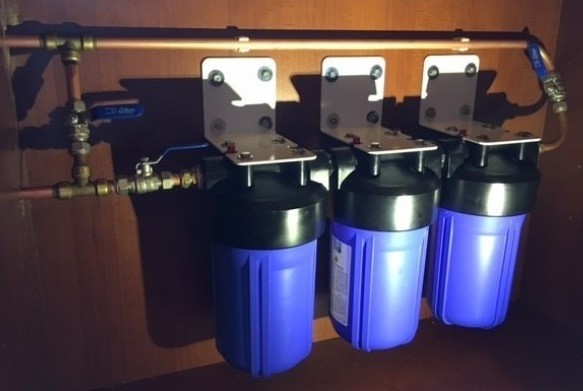A Whole House Water Filter – Is It Right For You?
If you are considering installing a water filter in your home you have a choice between using one or more point of use filters (POU) or installing a point of entry (POE) whole house water filter system that will provide filtered water throughout the entire household.
Where water for consumption is the only concern an undersink or countertop water filter would represent a perfectly adequate solution, with a wide choice of filter system able to remove a comprehensive range of undesirable contaminants.
However, when clean, safe water is wanted elsewhere such as for washing up, baths, showers and perhaps washing machines, dishwashers etc then a whole house filter becomes the only viable option.
The benefits of a Whole House Water Filter System include:
- Wide Choice of filter types – options for specialist cartridges for difficult to remove contaminants such as chloramine & fluoride.
- Broad spectrum of impurities removed – including chlorine, VOCs, bacteria, cysts, herbicides, pesticides, heavy metals such as lead.
- Filtered Water throughout the home – no need for separate POU filters saving money and time on maintenance.
- Higher Flow Rate – whole house filters are available in different capacities allowing the flow rate to be tailored to demand.
- Reduced Limescale – many of the filters available are able to reduce scaling thereby preventing damage to appliances.
- Cost Effectiveness – having a single point of filtration for the entire premises is cheaper than installing multiple separate filters.
- Adaptability – the use of stand sized housings allows for various cartridge types to be employed in cases where unexpected issues arise.
Disadvantages of a whole house filter, depending on the situation, may include the cost of the initial purchase and installation. These system are often larger than a simple drinking water type filter and, while not strictly necessary, it is far more convenient to have them installed with an isolating bypass arrangement for ease of maintenance, leading to higher installation costs.
The replacement filters, being of larger capacities may be more expensive, depending on the type employed.
Space is another important consideration. POE filters are normally situated near to where the rising main enters the house and will require adequate room, this can sometimes be an issue where multiple housings are to be installed and space is constricted.
Can Both POE and POU Systems Be Used Together?
Although not normally necessary there may be circumstances where such an arrangement might make sense.
For example where drinking water was the main concern but there was a problem with heavy sediment and restricted room for fitting a comprehensive whole house system it may be advantageous to fit an undercounter kitchen filter for drinking water but install a POE sediment filter.
Again, if there was limited space available for a complete system and it was desired to remove chlorine from the water throughout the home, then a single carbon filter could be used and a separate kitchen water filter for taking out a wider range of impurities from the drinking water
Which Whole House Water Filter System Is Right For You?
The ideal starting point for answering this question is to have a water test done. This will give an accurate indication of what contaminants are in the water, its hardness (pH) and whether there is a need for specialist micro-organism treatment, this being more likely where there is a private water source such as a well.
The second important consideration is the required flow rate. On the one hand you would not want to pay for a larger capacity system than you need but neither would you want to constrict your water use with one that’s too small for your homes requirements. Please see our article ‘How To Calculate Your Flow Rate’ for some guidelines in assessing this important parameter.
Some of the Whole House Filter Types Available include:
Sediment only filters –
Useful when there’s a problem with sediments and particulates as might occur when the water supply is from a peat laden source for example. These are graded according to the size of particle they will remove which is expressed in microns (a micron is 1:1,000,000 of a metre. a strand of hair is about 100 to 150 micrometers wide).
The largest generally being 50 microns and the smallest l micron although the NanoCeram cartridge filters down to 0.2 micron. Mosts cysts are larger than 1 micron so a sediment filter would be effective for this issue but needs to be a ‘1 micron absolute’ to guarantee effectiveness.
Chlorine, Taste & Odour Filters
Often the main concern of someone wanting to filter their home water is chlorine and rightly so. No one wants to drink or bathe in water smelling & tasting like a swimming pool. There are also health implications associated with the long term ingestion of chlorine and with breathing in chlorine vapour in the shower.
Filters of this type generally employ carbon, either as a block or as granular activated carbon (GAC) and represent an affordable solution to the chlorine problem. Such filters may also include KDF (Kinetic Degradation Fluxion) which furthers removes chlorine.
These filters achieve a very high removal rate for chlorine, normally 99.99%+ however it is important to be aware of the issue of chloramine (chlorine+ammonia), increasingly used in conjunction with chlorine which is not removed efficiently by standard carbon filters and requires a more specialist type to be used. Check with your water company whether they use this chemical in the treatment plant.
Comprehensive Multi Housing Filter Systems
The filters of choice where it is desired to remove the widest range of contaminants possible. Often comprised of two or even three filter housings these systems can also be the most expensive choice. One major advantage is that they allow the inclusion of specialist filter types eg. for chloramine or fluoride as well as those that will remove a broad range of impurities such as chlorine, pesticides, herbicides, hormones, VOC’s, hydrogen sulphide, cysts and protozoa and heavy metals including lead, with some types notably those using Active Ceramic media being able to additionally reduce limescale.
Such filters include systems such as the Osmio PRO-III-XL Ultimate Whole House Water Filter System which includes an Active Ceramics, a carbon with KDF and a granular activated carbon filter which will give the best possible home water.
Other systems such as the Osmio Pro-II-Advanced system will also remove a huge range of impurities and includes the Active Ceramics filter with the second housing containing a 5 micron carbon block cartridge.
Active Ceramics
A brief explanation of the amazing Active Ceramics filter media may be helpful.
This is a relatively new type of filtration media which employs 4 differing types of ceramic balls each with specific filtering properties. AC media will remove very many impurities including chlorine, toxins, heavy metals, hormones and fluoride. This filter is also highly advanced and effective at killing and containing bacteria in water such as E-coli, Pseudomonas and other microorganisms.
A further benefit of Active Ceramics is that it raises the pH of the water and adds antioxidants and minerals back into the water further increasing the water’s health giving effects.
The apparent downside of active ceramic cartridges and the systems employing them is the initial cost, making it seem an expensive investment, however it needs to be borne in mind that Active Ceramic cartridges have a life span of 2 to 3 years making them in fact a very cost effective option.

Ultra-Violet Disinfection Systems
Strictly speaking these are not filter systems as they do not of themselves remove anything from the water. What they do is to kill any and all micro-organisms that may be present, and they do so very effectively.
Ultra-violet light is lethal to the pathogens found in water and is a certain way to ensure freedom from biological contamination of your water supply
They will destroy cysts, bacteria, protozoa and even viruses ensuring that your water is biologically safe.
To work effectively however it is vital that all sediment has been removed from the water first as the micro-organisms can in effect ‘hide’ in the sediment particles and not receive a proper dose of UV light. For this reason it is strongly recommended that all UV systems be installed with one or more sediment pre-filters.

Maintenance of Whole House Water Filter Systems
The best water filter systems will become useless if not properly maintained. Fortunately this is not a difficult thing to achieve. Normally all that’s necessary is timely filter changes.
Working out when a filter change is needed is not an exact science however and will depend on many factors such as the type of filter, sediment levels, the total volume that has flowed through the system, pH and water contaminant levels. Generally they should be replaced at the recommended minimum time intervals but if the incoming water is not too bad this may be extended a little.
A very useful addition to the system is to include a simple water meter with your installation which will let you know the exact volume of water that has been filtered and makes calculating filter changes more accurate.
An isolating valve is very useful when changing or maintaining your filter and it is recommended that one or more be fitted at the time of installation.
A whole house water filter system can be a significant investment, it is however a very worthwhile one and will improve the quality of life in the home, can contribute to long term health and will bring the peace of mind in knowing that your home’s water is clean, safe, healthy and it also tastes great!
Whole House Water Filter Systems








Can you tell me more about if it helps to soften water. I live in an area with hard water.
Hi Abi, we supply a range of whole house filters and the choice will be determined by such factors as capacity neeeded, contaminants required to be removed, available space and budget. However filtration and hardness are two distinct issues and our whole house filters would have no significant effects on hardness. For this, a softener is required, either salt based (which require a separate bypass pipe direct to the main drinking tap), or a non salt softener which are better understood as scale prevention devices. Both have their pro’s and con’s though generally more people are choosing the non salt type for their ease of fitting and maintenance. Detailed explanations of their differences may be viewed here: https://puriflowfilters.co.uk/product-category/water-softeners/
Does your filter remove fluoride?
Whole house filters which utilise Active Ceramics filtration media will reduce fluoride. The question is by how much. This is difficult to answer definitively due to the number of factors affecting the outcome which includes such influences a pH, water pressure, the age of the filter etc. In general a whole house filter will be far less efficient at removing fluoride from the water than a dedicated fluoride drinking water filter which will achieve 85-97% removal depending on the system. This is largely because a whole house filter has to process a large amount of water in a short time resulting in less contact time with the filtration media. As an approximate guide 30-40% would be typical.